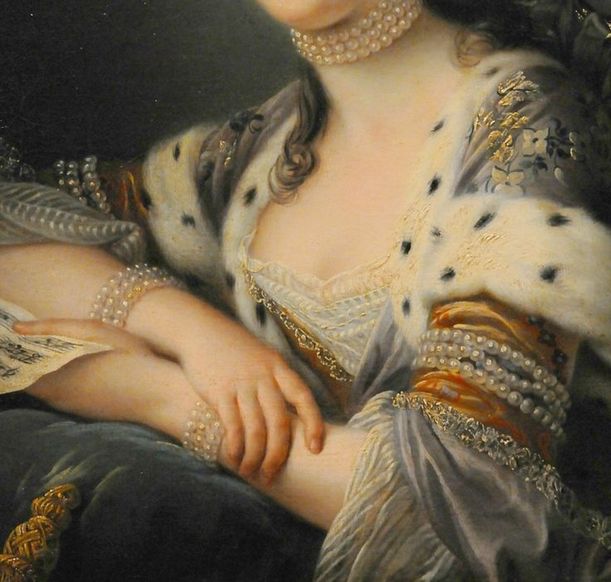 Portrait of a woman in Turkish costume. My head is so filled with everything that happened yesterday that I have to let it out! I was invited to dine with the Grand Vizier’s lady; no Christian has ever been invited for such an event. I decided that I wouldn’t satisfy her curiosity (which I bet was the point of her invitation) if I wore a traditional Turkish dress; so instead, I dressed like the women in the court of Vienna do. I went in a Turkish coach and was attended only by the woman who held my train and the Greek lady who was my interpreter. I was met by a black eunuch who helped me out of the coach and led me through several rooms where the slaves were sitting. They were dressed really nice too.
The lady was sitting on a sofa in a sable vest. She walked over to meet me, and introduced me to a dozen of her friends. She seemed really sweet and looks about fifty years old. I was so surprised to see that there’s really nothing grand in her house. The furniture was pretty modest and aside from the number of slaves she has, nothing about her seemed expensive. She totally knew what I was thinking because she told me that she no longer cares to spend her time or money on materialistic things, and that she's just concerned with charity and praying to God.
She was really hospitable and we talked until dinner was ready. Dinner was served one dish at a time. They use really rich spices in their food and the soup is served last. I felt bad that I couldn’t eat as much as the Lady wanted me to; she was so eager to serve me all kinds of food. At last, they served coffee and perfume, which is basically a sign of respect. The slaves kneeled and sprayed perfume in my hair, clothes, and handkerchief. After this, the Lady made her slaves play instruments and dance. Soon after, we left.
But the night wasn’t over yet. We visited the Kahya’s lady. I’m so glad to have gone there because it was such a difference from the Grand Vizier’s home. Lady Fatima, the Kahya’s lady, was sitting on a sofa covered with pretty Persian carpets and leaning on cushions of white satin. Two young and pretty girls covered in jewels sat at her feet. But they were hardly noticeable in comparison to fair Fatima. I have never seen anything so ridiculously beautiful and no face could ever draw attention like hers. She stood up to say hello and put her hand to hear heart with such sweetness. Although my interpreter told me Lady Fatima is beautiful, I was so amazed by her beauty that I was speechless for a few moments. Oh my God, her features! Her charm! Her perfectly proportional body! Her complexion! Her smile! Her eyes, so large and black and soft! Every angle of her face is beautiful.
After I caught my breath, I tried to find some kind of flaw in her; after examining her for a little bit, I found nothing. Nature had made her more beautiful than what Apelles could have ever painted. The most beautiful English woman would vanish near her.
Lady Fatima was wearing a caftan of gold brocade flowered with silver. The caftan was fitted and accentuated just the right parts. Her arms were decorated with bracelets of diamonds and her belt was set with diamonds too. On her head she wore a pink and silver Turkish handkerchief and her black hair was divided into many tresses. On the side of her head she was wearing a bunch of gorgeous jewels. I think you’re going to assume I am exaggerating her description. I read somewhere that women speak in rapture when they discuss beauty, but I don’t understand why they shouldn’t be allowed to do so. I’m not ashamed to say that I looked at the gorgeous Fatima with such pleasure that the finest sculpture couldn’t have given me.
Her maids sat beneath the sofa and I couldn’t help but imagine a picture of the ancient nymphs. I didn’t think such a beautiful scene ever existed. Lady Fatima ordered them to play and dance. I’m sure that the biggest prude on earth would have looked upon them and thought things I shouldn’t say. When the dance was over, four slaves came into the room and sprayed the air with perfume. Then they served us coffee in the prettiest china. Lady Fatima was so sweet; she called me Uzelle Sultanam, or the beautiful sultana, and felt bad that she couldn’t talk to me in English.
When I left, she gave me a basket of embroidered handkerchiefs. I swear I felt like I was in Mahomet’s paradise. I don’t know how all of this sounds to you but I hope you’re as excited as I am!
I’ve arrived safely at the end of my long journey! I won’t tell you about how tiresome it was, I’m sure you’d rather hear something about what I saw here in Turkey instead; after all, a letter from Turkey that has nothing extraordinary in it would be disappointing! ;)
Let’s see, most of you have never seen camels in real life, so I guess the description of them will be new to you. I’ve seen a ton of pictures of camels, but none of them were even close to what I saw with my real eyes. Although I could be making a false observation here, I feel like they resemble stags; their legs, bodies, necks, and color look exactly the same. But they are a lot bigger and faster. They can out-run horses; in fact, they brought the first news of the loss of the battle of Peterwaradin to Belgrade. Anyway, they have humps on their backs, so it’s difficult to load them. They’re actually pretty ugly creatures with heads too large and disproportionate to their bodies.
The horses here are not put to labor, nor are they fit for it. They’re really gorgeous though and full of spirit. They’re generally little and not very strong, but they are swift. I have my own white horse now that I’d never part with! You should see how he prances under me with so much energy that I’m tempted to mount him but I’ve never rid a horse in my life. When the Turks saw my sidesaddle, they looked at it with as much wonder as the Americans must have looked at the ship of Columbus.
I have to tell you about the house I’m staying in. I’m sure you’ve heard that houses here are so miserable, but trust me, that's not the truth. I’ve visited many of the houses here, so I can definitely speak from experience. It’s true that they don’t usually decorate the outside of their houses, which are built of wood. But I don’t blame their bad taste for this; I blame the oppression of the government. Every house is at the disposal of the Grand Signor so people don’t see the point in spending much on their homes. Their main concern is to build a home that’ll last. Every home, big and small, is divided into distinct parts that are joined together by a narrow passage. They rarely build above two stories and their stairs are broad and not usually more than 30 steps. One part of the house belongs to the lord and the adjoining one is called the haram, which is the ladies’ apartment. The ladies’ apartment is more grand, being filled with paintings and furniture.
The rooms are all spread with Persian carpets. The sofas are laid with richer carpet, and all round it a sort of couch raised half a foot, which is covered with rich silk or whatever the owner desires. Mine is made of scarlet cloth with a gold fringe. Round this, against the wall, are extravagant cushions. They are generally brocade or embroidery of gold wire upon satin. There is nothing more gorgeous than this. The seats are so comfortable that I never want to sit in a chair again. The ceilings are usually low and always made of wood. There’s pots of perfume or baskets of flowers between the windows, but what’s most fascinating to me are the marble fountains in the lower part of the room that throw up spouts of water, giving a nice coolness to the room and a enjoyable sound. Each house also has a bagnio for either hot or cold baths.
The gardens, planted with high trees and beautified with fountains, are where the ladies spend most of their time, listening to music or embroidering.
You’re probably surprised at my descriptions, which are so different from what you have been told by the common voyage-writers, who like to talk about things they don’t know. It’s really rare that a Christian is admitted into the house of a man of quality, let alone the harams, which are forbidden ground. So, these travel bloggers can only speak of the outside because women’s apartments are out of sight.
Anyway, I think I have shared a lot of stuff with you for once. If you’re not happy with the topics I’ve chosen to talk about, let me know what you’d rather me blog about!
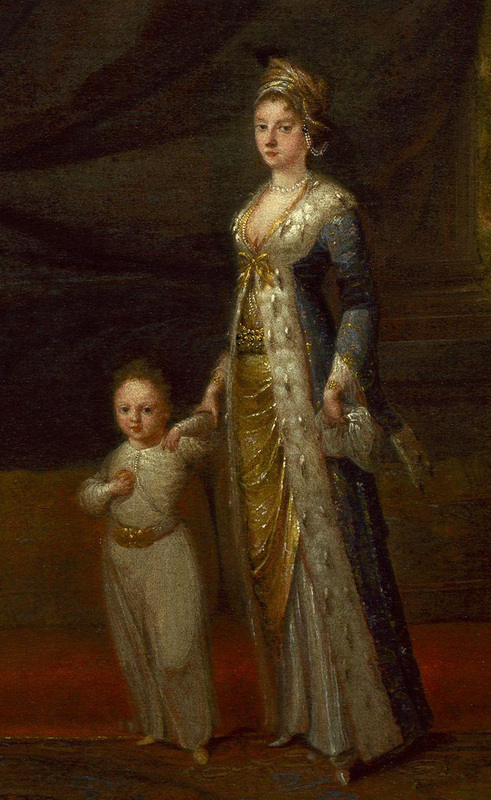 With my son, Edward. [1] Sarah, I should be mad at you for replying to my August email in December! I, on the other hand, have a good excuse for not having written back promptly. Traveling on land is so tiresome. But I am happier than you think I am and I am not lonely. Many Greek, French, English and Italians under our protection visit me often from morning till night.
There's barely any truth to the dreadful stories you've heard about the plague. There’s really little more to it than a fever; we passed trough two or three towns that are violently infected, but many people escape the plague and the air is never contaminated!
What I am about to tell you will make you wish you were here. The smallpox is so fatal and common in England, but it is entirely harmless in Turkey because of the invention of engrafting. Every September, a group of old women inoculate anyone who might have smallpox. An old woman asks you which vein you prefer to have opened and she inserts a large needle into the vein allowing as much venom as possible in. This seriously hurts just as much as a common scratch would. She then repeats this four or five times using other veins. Then children or young patients play together the rest of the day and are in perfect health. Then the fever seizes them and they are in bed for two days, or three (although rarely). In eight days time, they’re back to normal!
Thousands undergo this operation every year and no one has died from it. I am a strong advocate for the experiment and I intend to try it on my little son. I will work really hard to get make this operation a common procedure in England. Also, if I know any doctors who are willing to branch out of their common practice for the good of mankind, then I will also write them. If I live to return to England, I might have the courage to wage war with them! Anyway, I'll leave you to admire how heroic I am! [2]
 Hebrus River I assume you guys expect something entirely different in this letter since I have gone on a journey no Christian has undertaken in about a century! The most interesting thing that happened to me was being nearly overturned in the Hebrus river, and if I at all cared for the praises one receives once they die, I'd be sorry for having missed the conclusion of swimming down the same river in which the head of Orpheus repeated verses such a long time ago:
Caput a cervice revulsum,
Gurgite cum medio, portans Oeagrius Hebrus
Volveret, Euridicen vox ipsa, et frigida lingua
Ah! Miseram Euridicen anima fugiente vocabat,
Euridicen toto referebant flumine ripae. [1]
Who knows, maybe some of Alexander Pope’s witty friends might have found it a subject worth writing about.
At the moment, I am writing in a house situated on the banks of the Hebrus, which runs just under my window. My garden is full of tall cypress trees. My mind is filled with poetic thoughts right now! Summer has already arrived in this part of the world and the ground of Adrianople is laid out in gardens, and the banks of the river is set with rows of fruit trees. The Turks hang out there every evening. They choose a spot in the shade, spread out a carpet to sit and drink their coffee. The slaves entertain them by singing or playing instruments. Mr. Addison might here make the experiments he discusses in his travels; there isn’t one instrument among the Greek or Roman statues that is not played here.
I read Pope’s translation of Homer and found some passages that I didn't really understand the beauty of before. Much of the ancient Greek dress and fashion is still retained in Turkey. I seem to find remains of ancient Greece here in Turkey that can’t be found in any other country. It would be tedious to point out all of the similarities, but, for example, the princesses and great ladies spend their time embroidering veils in the same way we find Andromache and Helen described in The Illiad.
I should tell you a bit about the language here. The common Turk is very different from what is spoken at Court (which is a mixture of Arabic and Persian); it’s ridiculous to use common expressions when talking to a great man or lady just as it would be to speak broad Yorkshire or Somersetshire in the drawing room. The Turks have what they call a “sublime language,” a style that’s proper for poetry. I am sure you’d want to see an example of their finest poetry, and I’m happy to show you a copy of the verses that Ibrahim Bassa, a man of wit and learning, wrote for his princess, wife-to-be. I think you’ll agree this poem resembles the Song of Solomon, which was also written for a royal bride!
Stanza 1st
The nightingale now wanders in the vines;
Her passion is to seek roses.
I went down to admire the beauty of the vines;
The sweetness of your charms has ravished my soul.
Your eyes are black and lovely,
But wild and disdainful as those of a stag.
Stanza 2nd
The wished possession is delayed from day to day;
The cruel Sultan Achmed will not permit me to see those cheeks, more vermilion than roses.
I dare not snatch one of your kisses;
The sweetness of your charms has ravish'd my soul.
Your eyes are black and lovely,
But wild and disdainful as those of a stag.
Stanza 3rd
The wretched Pasha Ibrahim sighs in these verses;
One dart from your eyes has pierc'd thro' my heart.
Ah! when will the hour of possession arrive?
Must I yet wait a long time?
The sweetness of your charms has ravished my soul.
Ah! Sultana! stag-eyed, an angel amongst angels!
I desire and, my desire remains unsatisfied.
Can you take delight to prey upon my heart?
Stanza 4th
My cries pierce the heavens,
My eyes are without sleep,
Turn to me, Sultana, let me gaze on thy beauty.
Adieu, I go down to the grave.
If you call me, I return.
My heart is hot as sulphur; sigh, and it will flame.
Crown of my life! fair light of my eyes, my Sultana, my
princess.
I rub my face against the earth: I am drown'd in scalding tears,
I rave!
Have you no compassion? Will you not turn to look upon me?
It was really difficult for me to get these verses in a literal translation! The repetitions at the end of the first two stanzas are meant to sound musical; this is similar to the ancient manner of writing. The music of the verses seems to change in the third stanza, and he is more compassionate in the conclusion (where the “heart” is concerned). I feel this conclusion is more touching than our common practice of concluding a song of passion.
See? I’ve gone pretty far in my oriental learning, and honestly, I study very hard. I hope that my studies will allow me to continue entertaining you!
I plan on telling you all kinds of new stuff about this place! What will surprise you most is the way I look though…being in my Turkish clothing and all. I’ll attach a photo of myself! The first part of my dress is a pair of drawers that reach to my shoes and conceal my legs more modestly than your petticoats. They are a rosy color, brocaded with silver flowers. My shoes are white and embroidered with gold. Over this hangs my white silk gauze, edged with embroidery. The smock has wide sleeves that hang down my arm and is closed at my neck with a diamond button, but the shape and color of the bosom can be distinguished through it! The antery is a white and gold fitted waistcoat with very long sleeves falling back and fringed with deep gold fringe and have either diamond or pearl buttons. My caftan is also fitted to my body and reaches my feet, with very long sleeves. Over all of this is the belt, about four fingers wide, which is entirely made of diamonds and other gorgeous stones. Now depending on the weather, the curdee is a loose robe they throw on, made of a rich brocade (mine is green and gold) and lined with ermine or sables. The sleeves just barely reach below the shoulders.
The headdress is composed of a cap called talpock, which is made of fine velvet with pearls or diamonds in the winter, and of a light shinning silver stuff in the summer. The talpock is fixed on either side of the head that hangs a little ways down with a tassel that’s bound with a circle of diamonds or a richly embroidered handkerchief. On the other side of the head, the hair is laid flat and depending on individual taste, some ladies put flowers, feathers, or whatever they want; usually though, the ladies wear a large bouquet of jewels made to look like flowers, i.e. pearls, roses of different colored rubies, the jessamines of diamonds, jonquils or topazes, etc. Their hair hangs at its full length behind, divided into many tresses and braided with lots of pearls or ribbons!
It would be so surprising to find a woman who isn’t beautiful around here. They have the prettiest complexions in the world and generally large black eyes. The court of England does not have as many beauties as there are here. Generally, the ladies shape their eyebrows, and wear a lot of eyeliner so that at a distance, it adds very much to the blackness of them. They also paint their nails a rose-color, which I personally don’t like.
Now that I am a little more familiar with the customs in Turkey, I cannot but think of how extremely stupidity of all the writers were that gave accounts of the Turkish women. It’s so clear that these women have more liberty than we do. No woman, regardless of her rank, leaves the house without two muslins, one that covers her face but reveals her eyes, and another that hides her head and hangs half way down her back. They also cover their body shapes with a thing they call ferigee, which no woman appears without. This disguises them so that there is no way you can distinguish a great lady from her slave and no man dares to either touch or follow a woman in the street.
This masquerade allows them to do anything they want without getting discovered. So, you can imagine that not many wives are faithful in a country where they have nothing to fear from their lovers’ indiscretion. They don't have to worry about their husbands either; if they get a divorce, the rich ladies keep all of their money and property, and in addition, the husband is required to pay them. All in all, the Turkish women are the only free people in the Empire.
It’s true that the law allows men to have four wives, but a good man is not going to use that liberty and a woman of rank will definitely not tolerate it. If a man is unfaithful, he will keep his mistress in another house, just like the men in England do. Of all of the great men I know here though, only the Tefterdar keeps a few she-slaves and he has the reputation of a womanizer. Oh, and his wife lives with him but won’t see him ;)
All in all, people are not so different from one another as our travel bloggers would have us think. It would probably be more entertaining to make up some of my own customs but nothing is more pleasant than the truth.
The court in Adrianople is amazing. The Grand Signor’s eldest daughter, Fatma Sultan, was married a few days before I arrived. She is the widow of the late Vizier who was killed at Peterwaradin. Fatma never actually lived with him, but when the Vizier died, all of his wealth became hers. When Fatma met Mosayp, who is about fifty years old, she burst into tears. Although he is a man of quality and is a favorite of the Sultan, it wasn’t enough to make him appealing in the eyes of Fatma, who is only thirteen years old.
As powerful as the Grand Signor is, he trembles before the Turkish army. The army has absolute power over the government. If, for example, the minister of state were spoken badly of in a coffeehouse, the whole place would be shut down because there are spies everywhere. However, if a minister displeases the people he is dragged out to the street and his hands, head and feet are cut off. I can’t help but wish that English Parliament would send a bunch of your passive obedient men so they can see arbitrary government in its strongest light!
Yesterday, I went with the French Ambassadress to see the Grand Signor’s passage to the mosque. He was led by many janissaries (these were horse and foot guards) who wore huge white feathers on their heads and were dressed in lively colors. From a distance they looked like a garden of tulips! After the janissaries was the Aga of the janissaries, dressed in a purple velvet robe, lined with silver, whose two well-dressed slaves led him by a horse. Next to Aga, was the Kuzlir Aga dressed in a yellow cloth and six more horses richly furnished were led after him. I won’t bore you with all of the details on the various dresses and turbans (which distinguishes their rank) but know that they were all extremely rich and happy. There really couldn’t have been a more beautiful procession.
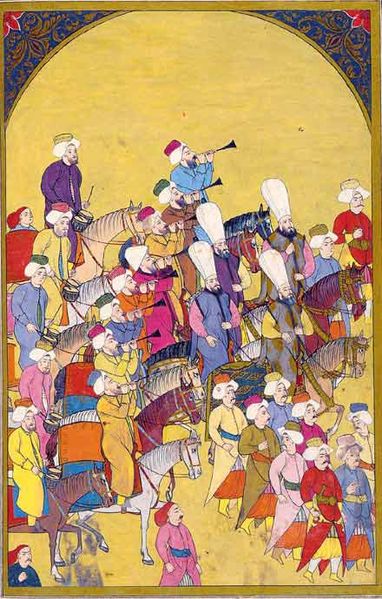 While this isn't exactly what we say, I thought it would help you guys get an idea! The music band of the Janissaries called mehterhane. They accompanied the company into battle and would play music according to the rhythm of the battle. The music was also used as a way of communication, such as retreat or attack. Ottoman miniature painting, from the "Surname-ı Vehbi" (fol. 171b). Topkapı Sarayı Müzesi, Istanbul. We also saw the Sultan, who looks about forty, and is very handsome and graceful. But his eyes are so full and black; there is something severe in his expression. He stopped under the window where we stood and looked at us very attentively.
I really can't stress enough the power the janissaries have in this country. I was having supper one night in a village on this side of Phillipopolis where our domestic guard met us. I asked for pigeons for my supper and one of my janissaries immediately ordered the cadi (the chief civil officer of the town) to send in some dozens. The poor man said he already sent some and couldn’t get any more. My Janissary immediately locked him up as a prisoner and out of respect to me, said he would punish him by my order, and if I wanted, he would bring me his head! This should show you the unlimited power these men have. The greatest man at Court speaks of them in a flattering tone only... But, I’ve said enough!
I’m not sure if this blog post is going to satisfy you, Abbe, but it’s clear that we have unreliable information regarding the manners and religion of these people. Most people who visit Turkey are merchants only interested in their own affairs, or travelers who don't stay long enough to give accurate reports.
I was thinking about Achmet-Beg, whom I met in Belgrade. He’s an effendi, or a scholar, and the scholars play prominent roles in the Turkish Empire. Talking to him gave me the opportunity to learn of their religion and morals in a way that maybe no Christian has ever had the chance to. I explained to Achmet-Beg the difference between the religion of England and Rome and he was happy to hear that there are many Christians who do not worship images or adore the Virgin Mary. He is not very fond of transubstantiation. I’m convinced that if Dr. Samuel Clarke had the chance to preach here, he would easily persuade his ideas to the Christians, whose notions are very little different from his anyway!
Mahometism is divided into as many sects as Christianity is. The Zeidi, Kadari, and Jabari reminded me of the Catholic, Luterhan and Calvinist sects we have, etc. The most prevailing opinion amongst the effendis is deism; however, this is kept secret from the people. Very few effendis (Achmet-Beg said there were none at all) would actually declare they didn’t believe in a God at all. Sir Paul Rycaut is wrong in calling the Muserin sect atheists because they are actually deists. Achmet-Beg didn’t admit to belonging to the Muserin sect, but he does deviate from some of Mahomet’s Law. For example, he drinks wine just as freely as we do. I asked him why he allows himself the liberty and he said although the prohibition of wine was a wise maxim, the prophet never intended on confining those who knew how to drink it with moderation. But he does avoid scandal and so he doesn’t drink it in public!
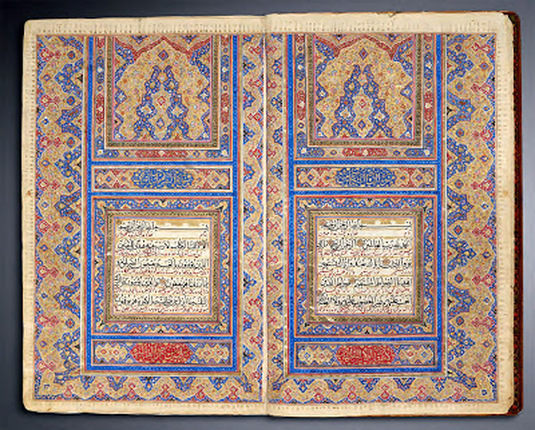 Manuscript of a Qajar Qur’an, Scribe: Abd al-Mudhnab al-Khatti al-Jani Abdallah Iran, Tehran, Qajar, dated 1233 H / 1817-8 CE Photo Credit: Islamic-Arts.org Achmet said that if I could read Arabic, I would really enjoy reading the Alcoran which is not at all like we English think it is. He said it’s of the purest morality written in the best language. Most of the copies we have are translations from the Greek priests, who would not hesitate to falsely interpret it--they are so corrupt and intolerant! Yet, they are not so different from the Romish Church. I have admit though, as much as I dislike the cruelty of your clergy, I dislike the barbarous persecutions of them when they don’t acknowledge the Pope even more.
Of all of the religions I’ve seen, the Arnounts seem the most particular. They are natives of Arnountlick and are the best militia in the Turkish Empire. They haven’t fully embraced Christianity or Mahometism and claim they are unable to judge which religion is best. But in order to avoid rejecting the truth, they follow both religions and so visit the mosque on Fridays and church on Sundays.
That is basically what I have gathered on the diversity of religions I have seen. Abbe, I am not going to apologize for the liberty I have taken in speaking of the Roman Catholic Church. I know you also expect me to tell you something about the antiquities of this country but there are barely any remains of ancient Greece. Anyway, I think I’ve told you everything worth telling in regards to my journey. When I’m in Constantinople, I’ll pick up on some more details and you’ll hear from me again!
Turkey feels like an entirely new world. I’m not going to bore you all with the details of our tedious journey, but I have to tell you what I saw in Sophia! It’s one of the most beautiful towns in the Turkish Empire and it’s famous for its hot baths. I purposely stopped in Sophia just to see the bathhouses. I hired a Turkish coach to drive me to the bagnio. The coach is entirely covered with scarlet cloth, lined with silk, and richly embroidered. So gorgeous! This covering hides the persons sitting inside, but can be thrown back. Many of the ladies peep through the lattices. When I arrived at the bathhouse at around 10 a.m., it was already filled with women. The bathhouse is built of stone and is in the shape of a dome. There weren’t any windows except for the roof, allowing a lot of light in. After I paid the portress who stands at the door (I noticed the ladies of quality paying her so I made sure to do the same), I entered a large, marble paved, room with four fountains of cold water; the water fell into basins first and then ran on to the floor in little channels which carried streams of water into the next room. There were also marble sofas, but they were so hot with steams of sulfur that you couldn’t possibly stay there with your clothes on.
Although I was not dressed like the women at the bathhouse (I just had one of my dresses on), they treated me with such kindness and civility. I am certain there isn’t a single lady back in England who would have treated a stranger with such politeness. They actually repeated over and over to me “Uzelle, pek uzelle,” which means, “Charming, very charming.”
They sat on sofas covered with cushions and rich carpets and their slaves sat behind them, but you couldn’t tell the difference in their social rank by their clothes because they were all…well, naked. However, there wasn’t anything sexually immodest about them! I cannot describe to you in words how utterly beautiful these women are. They walked and moved with the same grace that John Milton describes of Eve in Paradise Lost. They resembled the perfectly proportionate goddesses drawn by Guido and Titan, their skin is shiningly white, and their beautiful hair is divided into tresses and braided with either pearl or ribbon. I swear if it were the fashion to go naked, their faces wouldn’t be noticed. I greatly admired their fine skin and perfect body shapes. I secretly wished that Mr. Gervase [1] had the ability to go invisible and observe these ladies in their different postures, some lying on their cushions, others conversing, braiding hair, working, or drinking coffee…I think it would improve his art ;)
One of the women insisted I sit by her and undress for the bath. The ladies were adamant in persuading me to undress, but I had to refuse. In the end, I was forced to open my dress and show them my corset, which satisfied them. They couldn’t believe I was so locked up in that machine and they attributed my wearing it to my husband.
I wanted to spend more time with the women but Mr. W wanted to continue our journey to Constantinople early the next day, so I left before I really wanted. Anyway, I’m sure I entertained you with a sight you’ve never seen in your life and no male, travel book can inform you of! It is like death for a man to be caught in one of these places.
|

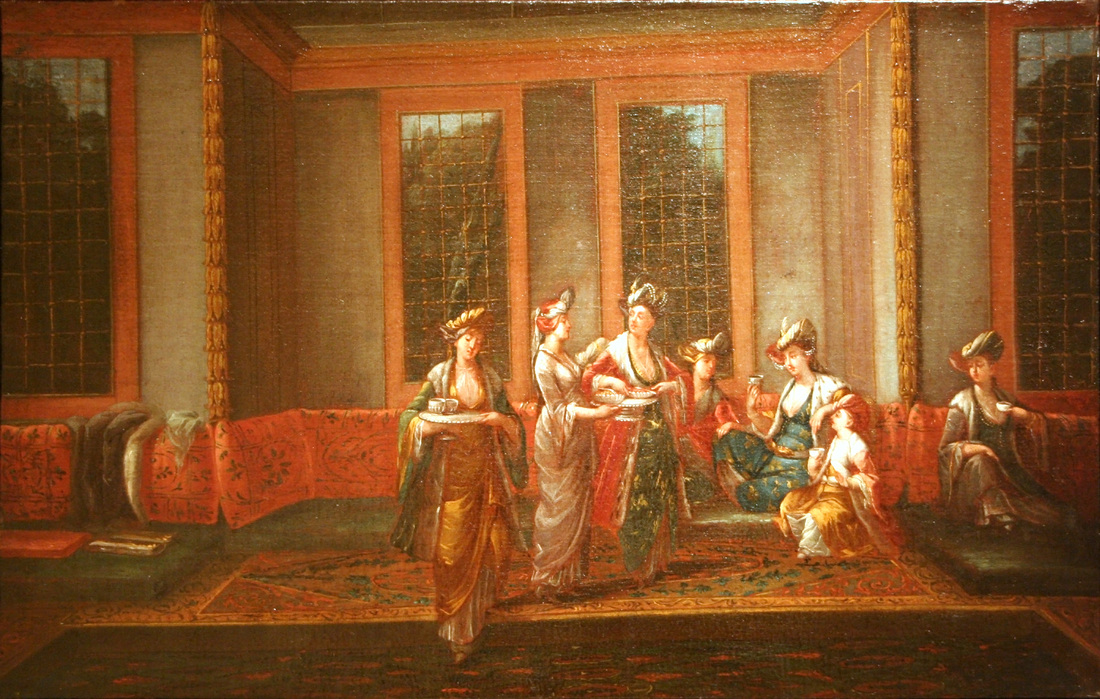


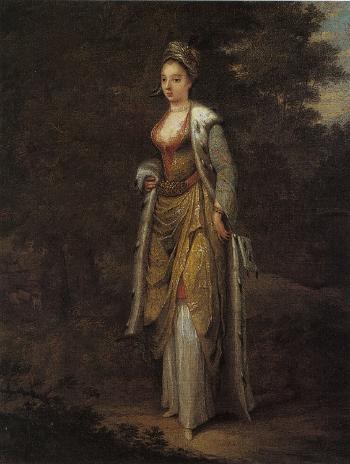


 RSS Feed
RSS Feed